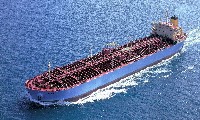
Imagine you own the road in front of your property.
People are free to use the road at no charge. You set up a lemonade stand, hoping to capture some business benefit from your location. But only a few stop by the stand, and the revenue generated does not cover the cost of any lane markers, road repair, or security services you provide.
The security service is needed because there is a small group of people who sit in fast cars on your neighbor's property and occasionally race onto your part of the road and rob passersby. These robbers then skedaddle back to your neighbor's property where, by agreement among all the neighbors, you are not allowed to do anything to them.
As the flow of traffic on your section of road increases, so does the intrusion by these robbers, and the users of the road begin complaining and urging you to take more action to stop the robberies. Some even threaten, though politely, to station their own security force on your property to help "keep the peace."
These same people, on the other hand, are unwilling to allow you to charge the road users for the use of the road.
Among the users, most just pass through without much fuss. On the other hand, some abuse the privilege by tossing trash out the window as they drive by, polluting your property.
Welcome to the world of the nations sitting on the Malacca Strait.
As noted in this, there is a tension between the sovereign rights of the states in the Malacca Strait littoral and the countries that use the Strait as a sea lane. The users seek security and safety, the states seek control and would like to gain some benefit from their efforts at making the Strait safer.
Of course, it's not realistic that Indonesia or Malaysia could, by force of arms, shut down their portion of the Strait. Instead, they will have to suffer along with whatever is offered to them that doesn't threaten their legal rights over that portion of their territorial waters that just happens to lie within one of the major ocean trade choke points.
The states bordering the Straits of Malacca and Singapore (the Straits states -- Indonesia, Malaysia and Singapore) and the extraregional maritime powers that depend heavily on the Straits for transit of commercial and naval vessels have divergent interests. More than 70 percent of vessels using the Straits do not call at any Straits state port and thus the Straits states receive no direct benefit from their passage.
Yet the Straits states have been bearing the brunt of the burden of maintaining the safety and security of navigation and the environment there. Consequently, the Straits states have been trying to forge an agreement with the user states to assure that they contribute to Straits safety and security.
***
Malaysia and Indonesia are primarily concerned with both their conceptual and practical sovereignty in the Malacca Strait, i.e., control, and keeping the Strait free from pollution, as well as preventing piracy, smuggling, and illegal fishing. Singapore and the user states are much more concerned with the safety and security of navigation. The United States in particular is interested in preventing possible terrorist attacks on its vessels and in interdiction of vessels carrying weapons of mass destruction.
***
The Straits states' long-standing hope that the user states would finally begin to significantly share the burden remains largely unfulfilled. Such assistance could take the form of contributions to projects identified and agreed with the littoral states either in the form of direct financial contributions or in-kind technical assistance or equipment.
However, such contributions remain voluntary and other than long-term contributor Japan, the only other user state offering such assistance is China. Moreover the agreement does not define user states or the direct and indirect beneficiaries of Straits use such as shippers, shipping companies and consumers of oil and goods that transit the Straits.
On one hand, it appears that the U.S. and other beneficiaries of this "free ride" need to step up to the plate and offer up some financial assistance to the littoral states to assist them in helping themselves and keeping the sea lane open.
On the other hand, from the Strait users point of view, there must be a concern that any precedent set in assisting the states along the Malacca Strait might open up claims from other nations that sit on sea lanes like Iran and Oman on the Strait of Hormuz, Bosphorus or the countries along the Red Sea/ Bab el-Mandab.

A delicate balancing act for all concerned. Meanwhile, the ships continue to sail.

No comments:
Post a Comment